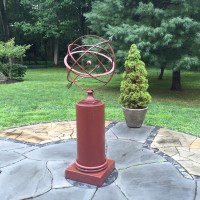Homecoming
This morning I woke up and, after taking the dog out to do his business before the rain started, made up my bed, smoothing the linen cover, plumping the pillows, setting the lavender sachet among the pillows just so. Then I went downstairs and made coffee, and while the water boiled I looked out the window into the garden at the armillary placed in the center of the stone circle. The armillary’s arrow points due north, a sort of North Star, situating me, in the place, in this home.
I was well into middle age when My Best Beloved and I moved into this house, and it is the first house I’ve ever truly thought of as home.
If I look back over the novels and short stories I’ve written, a theme seems to run through: “Where is home?” Each of the major characters in my novels — from young Irene in THE STUBBORN SEASON to Matthew in THE RADIANT CITY, Albert in OUR DAILY BREAD, Coleen in THE EMPTY ROOM, Wilona in AGAINST A DARKENING SKY, are people searching for place, people and faiths to call their own. Home.
This is not, obviously, merely a physical reference to place. It is tied up in the responsibilities and bonds we have to other people as much as to landscape. But the idea of home: safe, sheltering, hospitable, nurturing, secure… it is perhaps the central metaphor of my life. I always feel my soul-home is somewhere else, that I don’t quite belong here, that I don’t experience the world as other people do, that I don’t fit. And so I write about it. Even when I think I’m writing about something else. Funny how that happens.
In the pagan spiritual traditions, as well as the Celtic imagination (both mythological and literary), landscape is alive and should be encountered with reverence. It speaks to us; it is the book of the world, full of wisdom and guidance. And some places feel ‘right’ in a way others don’t. That’s a bit of a mystery. Why do I feel so at home in the wild and wind-swept outposts of Ireland, Scotland and Wales, but beautiful, elegant-as-well-as-earthy France leaves me unmoved, although intellectually I understand the strong attraction others feel for Paris?
I believe there is a soul-recognition when it comes to landscapes, and what is sacred to one person just feels bleak to another. This recognition is part of the communication between our soul and our conscious mind and should be attended.
Of course, not all of us have luxury of living in the landscape of our dreams. What is one to do if one is fed by broad horizons and empty space but lives in a cramped apartment in a loud, dirty city? It’s harder then, to be sure. But it’s not impossible. I’ve lived in some real horrors over the course of my life, in dangerous neighborhoods, without enough food in the cupboard, but even in those places, which frightened me and made me feel so alone in the world, I worked to form a temenos, a sacred space. A polished blue bottle set on the windowsill to catch the light, a little like stained glass, invited me to see beauty. One pretty cup from which to drink my tea offered me a moment of calm. Feeding the abandoned kitten who eventually adopted me, let me know I wasn’t alone.
When I was in period of soul-sickness — through addiction among other things — my environment reflected that. It was neglected, dirty, chaotic and disorganized. What was broken stayed broken. Grime layered the floors, the tabletops and the windows. It wouldn’t have mattered if I’d lived in a mansion — it would still have been squalid. As I began to get well, my environment began to reflect that growing health — among other things, the trash got taken out, both physically and spiritually.
Creating hospitable space — by which I mean space both internal and external that allows us to grow spiritually and to heal whatever wounds we may have — is soul work and requires attention. “Does that closet need cleaning out?” is a spiritual question in the same way “Should I hang an icon of St. Frances de Sales, patron saint of writers, above my desk?” both affect the way we read that ‘book of the world’ and our relationship with it.
The rosemary we grow in a pot on the kitchen counter cleanses the space of bad memories, the candle we light at the table on which we eat our grilled cheese sandwiches blesses the meal, the feather we found in the street and place in a bowl beside our beds reminds us we are creatures whose souls are not tethered to circumstance — we can rise above. The coffee in an old cracked cup we share with the friend who needs a sympathetic ear is a sacrament.
The soul expresses itself in the world around us, and the way we move through it. We recognize the places that feed our soul. In some places — by the sea, in the highlands, in the heart of the forest — it is perhaps easier to hear the voice of the sacred on the wind, and if we can, taking the occasional retreat to such places goes a long way to refreshing the soul. However, I believe there is no place the Sacred cannot be found. I’ve seen it in prisons. I’ve seen it in dark basements. I’ve seen it in cold, institutional hospital rooms. I’ve felt it in welfare housing apartments. We can, if we are attentive to our souls, carve out space for them, express them, wherever we are.
Home is written on the book of the world as well as the book of our hearts, and we can expand it by paying attention and creating interior space for prayer, silence and communion as well as external manifestations of that home in our environment.
The Irish poet and philosopher John O’Donohue has said that spirituality is “the art of homecoming.” May your homecoming be wonderful, and may your home be filled with delight.


Dear Lauren, another exceptionally touching essay, thank you. I loved the theme and your clear way of expressing your thoughts and feelings. This paragraph really struck a chord with me:
“The rosemary we grow in a pot on the kitchen counter cleanses the space of bad memories, the candle we light at the table on which we eat our grilled cheese sandwiches blesses the meal, the feather we found in the street and place in a bowl beside our beds reminds us we are creatures whose souls are not tethered to circumstance — we can rise above. The coffee in an old cracked cup we share with the friend who needs a sympathetic ear is a sacrament.”
Sincerely, Angela